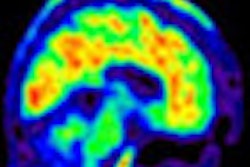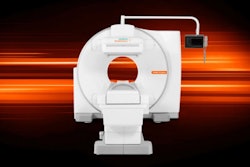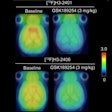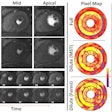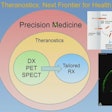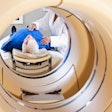A U.S. Centers for Medicare and Medicaid Services (CMS) advisory committee said on Wednesday that more studies are needed to confirm the efficacy of Eli Lilly and Avid Radiopharmaceuticals' Amyvid radiopharmaceutical for brain beta-amyloid PET imaging.
Amyvid (florbetapir F-18) took center stage at the January 30 hearing of CMS' Medicare Evidence Development and Coverage Advisory Committee (MEDCAC). While the radiopharmaceutical received clearance from the U.S. Food and Drug Administration (FDA) in April 2012, it has not yet been approved by CMS for reimbursement.
The advisory committee spent the day hearing reviews of available research and public comments on the use of beta-amyloid PET imaging to diagnose and manage dementia and neurodegenerative disease such as Alzheimer's. Much of the testimony centered on the clinical impact brain beta-amyloid PET imaging could have on patient outcomes.
The panel vote averaged 2.2 -- with 5 rated as high confidence -- regarding MEDCAC's degree of confidence that there is adequate evidence to determine whether brain beta-amyloid PET imaging changes health outcomes of patients who display early symptoms. Committee member Dr. Jeffrey Cozzens, chair of neurosurgery at Southern Illinois University School of Medicine, said there have been "too few studies" to confirm the benefits of the imaging technique.
Dr. Art Sedrakyan, PhD, MEDCAC vice chair and director of the Patient-Centered Comparative Effectiveness Program at Weill Cornell Medical College, was concerned with the uncertainty regarding false-positive results and "how much the harm associated with false positives can outweigh the benefits. I am not sure I have enough data to weigh the benefits and harms of this particular technology."
Wei-Li Shao, senior director of Eli Lilly's Alzheimer's business division, expressed the following in a prepared statement issued after the hearing: "The overwhelmingly positive testimony presented by the medical experts around the clinical utility of beta-amyloid imaging agents reinforces that these tools should be a Medicare covered benefit for patients with cognitive impairment being evaluated for Alzheimer’s disease and other causes of cognitive decline."
"When making a final coverage decision, we encourage the Centers for Medicare and Medicaid Services to heavily consider the real-world medical experience presented today and the appropriate use criteria recently released by the Society of Nuclear Medicine and Molecular Imaging and the Alzheimer’s Association supporting the use of these imaging agents," he said.
Research results
In addressing the panel earlier in the day, Dr. Mark Mintun, Avid Radiopharmaceuticals' chief medical officer, testified that the company has "established the safety, efficacy, and reliability of Amyvid as an FDA-approved drug for imaging beta amyloid. There is implicit clinical utility for ruling out Alzheimer's disease with a negative scan."
He cited a study published online January 14, 2013, in Alzheimer Disease & Associated Disorders that evaluated the frequency of Alzheimer's and non-Alzheimer's diagnoses, ancillary testing, and patient management before and after PET imaging with florbetapir. The study included 229 patients at 19 clinical sites.
After receiving the results of florbetapir scans, physicians changed their diagnosis in 125 cases (55%) and diagnostic confidence increased by an average of 22%. In addition, 199 patients (87%) had at least one change in their treatment plan.
The lead study author was Dr. Michael Grundman, president and CEO of Global R&D Partners, a consulting firm that works with pharmaceutical and biotechnology companies to develop novel agents for diagnosing and treating disease. He previously served with the Janssen Alzheimer Immunotherapy Research and Development and at the University of California, San Diego.
Benefit vs. risk
Also speaking at the hearing was Dr. Steven Pearson, president of Massachusetts General Hospital's Institute for Clinical and Economic Review, who outlined some of the potential benefits and pitfalls of beta-amyloid scans.
The potential benefits of a positive test might be the ability to start beta-amyloid-specific treatment earlier, the opportunity to seek clinical trials, and the ability of patients and their families to plan more effectively for the future based on an accurate diagnosis, he said.
"The harms could be additional patients being started on drugs that are of limited or no benefit," Pearson added. "There could be discrimination or difficulty in obtaining long-term care or life insurance based on diagnostic approaches."
The potential upside of a negative scan could be a more treatable cause of a patient's ailment and a reduction in the number of patients who continue to take unnecessary drugs.
"However, there are potential harms of negative or false-negative results, especially false-negative tests, if there is additional aggressive diagnostic testing that does not improve outcomes, as well as unnecessary risks and costs or false patient reassurance from a false negative," he said.
Dr. David Kuhlmann, a neurologist and sleep specialist at Bothwell Regional Health Center in Sedalia, MO, was among the skeptics at the hearing. He testified that the beta-amyloid scan has not been proved useful in predicting the development of dementia or other neurologic conditions, nor has usefulness been shown for monitoring responses to therapy.
"My big fear with beta-amyloid therapy is that it will show only marginal efficacy, but will be given FDA approval because we really don't have anything else that is very effective in Alzheimer's," Kuhlmann said.






